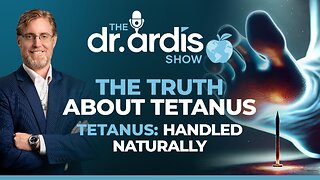Premium Only Content

Episode 12.18.2023 - World AIDS Day - AIDS Awareness
In this episode, Dr. Brian Ardis discusses various topics related to HIV/AIDS awareness, treatment, and its potential connections to snake venom and genetic engineering.
He discusses HIV/AIDS statistics in the US, emphasizing the importance of testing and medical care. Many people may have HIV but are undiagnosed due to disruptions caused by COVID-19 lockdowns. Dr. Ardis notes that male-to-male sexual contact accounts for a significant percentage of new diagnoses, with African Americans being disproportionately affected. The majority of new HIV diagnoses since 2021 have been among gay and bisexual men.
He questions the need for genetic engineering and its potential impact on humanity, also mentioning the origin of the term "virus." Dr. Ardis suggests a connection between COVID-19 spike proteins, snake venom, and HIV, highlighting similarities. He claims that snakes, specifically the Chinese crate and Chinese cobra, are the origin of COVID-19, based on DNA analysis. Dr. Ardis discusses the similarity between the rabies virus and snake venom and how nicotine can inhibit rabies virus binding to nicotine receptors. He explores the potential of venom peptides from animals to prevent and treat viral diseases, including HIV, rabies, and COVID-19.
Dr. Ardis mentions the use of venom-based vaccines and treatments for various diseases, including HIV and dengue virus. He discusses marine sponge venom being used to create vaccines for HIV patients, despite causing immune deficiencies similar to AIDS. Dr. Ardis claims that HIV spike protein is similar to snake venom neurotoxin and COVID spike proteins were derived from snake venom neurotoxin. He mentions the targeting of alpha seven nicotinic receptors by snake venom spike proteins and their potential for treatment development. Dr. Ardis suggests that nutritional deficiencies can impact HIV disease progression and mortality, citing a study from the University of Miami School of Medicine.
Nutritional deficiencies impair immune function in HIV/AIDS patients, leading to faster disease progression and increased mortality. He highlights a 1995 study from the University of Georgia that found supplementing with selenium may prevent HIV patients from developing AIDS. Dr. Ardis recommends selenium supplementation for immune boosting and HIV prevention, along with vitamin A and vitamin E for immune system support and flu/cold prevention.
-
 48:43
48:43
The Dr. Ardis Show
11 days ago $13.28 earnedThe Dr. Ardis Show | Tetanus: Handled Naturally | Episode 06.18.2025
31.7K16 -
 2:23:35
2:23:35
TheSaltyCracker
6 hours agoSo Much Winning ReeEEeeStream 06-29-25
92.6K249 -
 6:05:51
6:05:51
SpartakusLIVE
7 hours ago#1 Texas FARMBOY Turned World-Wide Gaming SUPERSTAR amasses NERDS in chat from the ENDS OF THE EARTH
64.3K -
 9:37
9:37
MattMorseTV
10 hours ago $1.73 earnedThis just ENDED his CAREER.
9.42K39 -
 9:10:30
9:10:30
Spartan
10 hours agoPro Halo Player | Grinding, Another day to try and get better
36.7K1 -
 2:31:12
2:31:12
Nerdrotic
7 hours ago $5.50 earnedCosmic Summit Recap, Skinwalker Ranch Season 6 | Forbidden Frontier #106
119K5 -
 LIVE
LIVE
This is the Ray Gaming
3 hours ago $1.02 earnedSunday Night With The Homies
385 watching -
 2:26:29
2:26:29
vivafrei
16 hours agoEp. 270: MASSIVE SCOTUS WINS! Big Beautiful Bill! New-Scum Sues! Diddy Watch! Big Apple Rot & MORE
135K106 -
 8:38:54
8:38:54
a12cat34dog
10 hours agoTHE *NEW* KRATOS IS EPIC :: God of War (2018) :: FIRST-TIME PLAYING {18+}
32K3 -
 3:12:50
3:12:50
EricJohnPizzaArtist
4 days agoAwesome Sauce PIZZA ART LIVE Ep. #52: GEYCK!
33.8K3